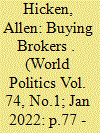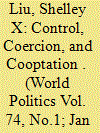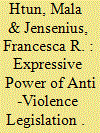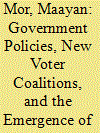|
|
|
Sort Order |
|
|
|
Items / Page
|
|
|
|
|
|
|
| Srl | Item |
| 1 |
ID:
184995


|
|
|
|
|
| Summary/Abstract |
Studies of electoral clientelism—the contingent exchange of material benefits for electoral support—frequently presume the presence of strong parties. Parties facilitate monitoring and enforcement of vote buying and allow brokers to identify core voters for turnout buying. Where money fuels campaigns but elections center around candidates, not parties, how do candidates pitch electoral handouts? The authors analyze candidates’ distribution of cash during an Indonesian election. Drawing upon varied data, including surveys of voters and brokers, candidates’ cash-distribution lists, and focus-group discussions, they find heavy spending but little evidence of vote buying or turnout buying. Instead, candidates buy brokers. With little loyalty or party brand to draw on, candidates seek to establish credibility with well-networked brokers, who then protect their turf with token payments for their own presumed bloc of voters. The authors find little evidence of monitoring of either voter or broker behavior, which is consistent with their argument that these payments are noncontingent.
|
|
|
|
|
|
|
|
|
|
|
|
|
|
|
|
| 2 |
ID:
184994


|
|
|
|
|
| Summary/Abstract |
This article examines how rebels govern after winning a civil war. During war, both sides—rebels and their rivals—form ties with civilians to facilitate governance and to establish control. To consolidate power after war, the new rebel government engages in control through its ties in its wartime strongholds, through coercion in rival strongholds where rivals retain ties, and through cooptation by deploying loyal bureaucrats to oversee development in unsecured terrain where its ties are weak. These strategies help to explain subnational differences in postwar development. The author analyzes Zimbabwe's Liberation War (1972–1979) and its postwar politics (1980–1987) using a difference-in-differences identification strategy that leverages large-scale education reforms. Quantitative results show that development increased most quickly in unsecured terrain and least quickly in rival strongholds. Qualitative evidence from archival and interview data confirms the theorized logic. The findings deepen understanding of transitions from conflict to peace and offer important insights about how wartime experiences affect postwar politics.
|
|
|
|
|
|
|
|
|
|
|
|
|
|
|
|
| 3 |
ID:
184993


|
|
|
|
|
| Summary/Abstract |
We know more about why laws on violence against women (VAW) were adopted than about how much and in what ways these laws affect society. The authors argue that even weakly enforced laws can contribute to positive social change. They theorize the expressive power of VAW legislation, and present evidence for a cautiously optimistic assessment of current trends on violence against women and the ways that VAW laws affect social norms. Focusing on a time of major legal change related to VAW in Mexico, this article explores trends in behavior and attitudes related to violence by analyzing four waves of the National Survey on the Dynamics of Household Relations (ENDIREH), which include detailed interviews with thousands of Mexican women. The authors find that over this period, the share of women experiencing intimate-partner abuse declined, attitudes condoning violence shifted, reporting rates rose, and most women learned about legislation to protect their rights. These changes are consistent with the authors’ expectations about the expressive power of anti-violence legislation.
|
|
|
|
|
|
|
|
|
|
|
|
|
|
|
|
| 4 |
ID:
184996


|
|
|
|
|
| Summary/Abstract |
Conventional theories of ethnic politics argue that political entrepreneurs form ethnic parties where there is ethnic diversity. Yet empirical research finds that diversity is a weak predictor for the success of ethnic parties. When does ethnicity become a major element of party competition? Scholars have explained the emergence of an ethnic dimension in party systems as the result of institutions, mass organizations, and elite initiatives. But these factors can evolve in response to an emerging ethnic coalition of voters. The author advances a new theory: ethnic cleavages emerge when voters seek to form a parliamentary opposition to government policies that create grievances along ethnic identities. The theory is tested on rare cases of government policies in Prussia between 1848 and 1874 that aggrieved Catholics but were not based on existing policies or initiated by entrepreneurs to encourage ethnic competition. Using process tracing, case comparisons, and statistical analysis of electoral returns, the author shows that Catholics voted together when aggrieved by policies, regardless of the actions of political entrepreneurs. In contrast, when policies were neutral to Catholics, the Catholic party dissolved.
|
|
|
|
|
|
|
|
|
|
|
|
|
|
|
|
|
|
|
|
|